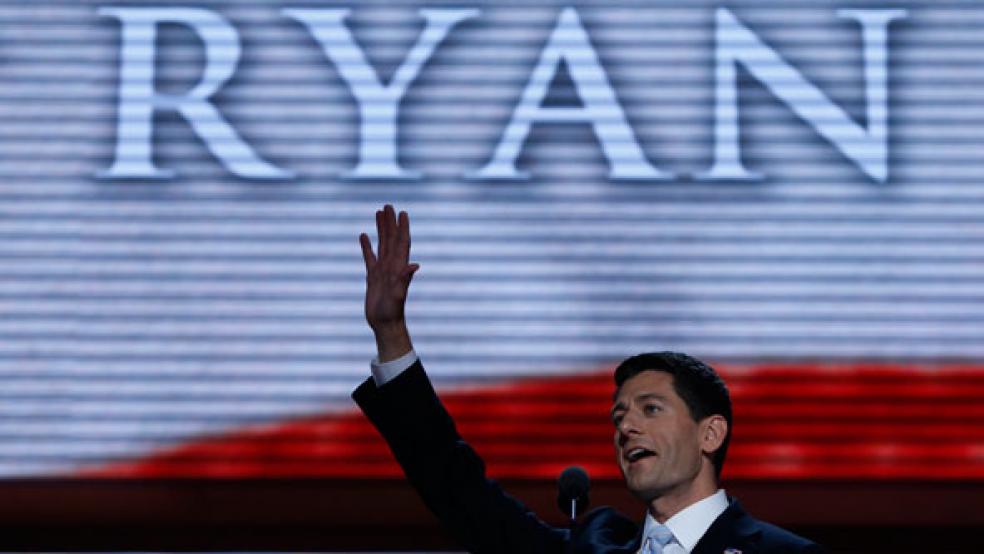Paul Ryan stoked the Republican faithful on Tuesday night with an attack on why the Obama presidency that began with such promise faded into disappointment, rallying a crowd at the party’s national convention in Tampa that previously seemed to be more exhausted than inspired.

The vice presidential nominee ticked through the problems of an administration whose early rhetoric never quite matched its eventual record. And yet where Ryan’s critique showed the folly of making overly ambitious campaign pledges, his speech was loaded with the same kind of grand assurances that Mitt Romney—should he win—will struggle to fulfill.
In a sense, the election boils down to credibility—a choice by a group of swing voters deciding whether Obama’s performance as president generates more trust than Romney’s potential.
Ryan, 42, aimed at the piñata constantly bashed by the GOP—Obama’s government health care plan ensuring coverage for the entire country. The House Budget Committee chairman portrayed it as a priority misstep and a political battle that came at the expense of lifting the economy out of its worst cataclysm since the Great Depression.
“Here we were, faced with a massive job crisis – so deep that if everyone out of work stood in single file, that unemployment line would stretch the length of the entire American continent,” he said. You would think that any president, whatever his party, would make job creation, and nothing else, his first order of economic business. But this president didn’t do that. Instead, we got a long, divisive, all-or-nothing attempt to put the federal government in charge of health care.”
The Affordable Care Act—popularly known as Obamacare—will start to take effect in 2014, while the painful echoes of the recession linger in a country coping with 8.3 percent unemployment, stagnant wages, depressed home values, and four straight years of $1 trillion deficits intended to stop the situation from becoming even worse.
“Obamacare, as much as anything else, explains why a presidency that began with such anticipation now comes to such a disappointing close,” Ryan said. “It began with a financial crisis; it ends with a job crisis. It began with a housing crisis they alone didn’t cause; it ends with a housing crisis they didn’t correct. It began with a perfect Triple-A credit rating for the United States; it ends with a downgraded America.”
Not every punch thrown by the Wisconsin congressman landed perfectly. He noted that the General Motors plant in his hometown of Janesville was shuttered despite the words of comfort provided on its floor by Obama in 2008.
Obama campaign spokesman Ben LaBolt leapt at the opening. “Ryan again talking about auto plant that closed under the Bush administration,” LaBolt instantly tweeted. “They really won't let facts get in the way of a good story.”
And that inevitable tension between truth and narrative will play out as the presidential campaigns barrel toward the November election. “A Romney-Ryan administration will protect and strengthen Medicare,” the candidate told the fiery crowd. “In this election, on this issue, the usual posturing on the left isn’t going to work.”
The GOP plan would essentially turn the entitlement into a voucher-type program for those under 55, not quite a gutting that Democrats warn seniors about but an unmistakable and quite possibly counterproductive revamp of one of the government’s largest programs.
What went unsaid was that over the next decade, the Obama and Ryan budgets would slow the projected growth rate of Medicare so that instead of composing 4 percent of gross domestic product it would be 3.5 percent, according to a column by David Wessel of The Wall Street Journal.
Ryan—no surprise—also pledged to repeal Obamacare, which would mean that a Romney administration’s agenda would have to eventually deal with the question of reforming Medicare and Medicaid at a time when jobs are a priority.
If Obama squandered his first several months in office by fighting to pass the health care bill, as Ryan claimed, then it’s fair to wonder how Romney would avoid the same pitfall when undoing the law. No answers were provided by Ryan, not that it mattered necessarily to the delegates packed into the Tampa Bay Times Forum.
But most tellingly, Ryan pledged that 12 million new jobs would be created over the next four years under a Romney administration. Those would be the result of lower tax rates and reduced government spending giving the private sector more room to breathe, based on the Republican agenda.
However, consider the past two times in modern history where the economy cranked up payrolls by that much. The Bureau of Labor Statistics shows that the economy added 12.07 million jobs during Bill Clinton’s second term, a period of higher tax rates that Obama would seek to restore for those earning more than $250,000 a year.
The United States previously created 12.86 million jobs from 1976 to 1979, Gerald Ford’s last year through the middle of Jimmy Carter—a president best regarded among Republican circles for being unseated in 1980 by Ronald Reagan.
“The failures of one administration are not a mandate for a new administration,” Ryan conceded. “A challenger must stand on his own merits.”
And then, Ryan humanized his running mate in a way that five years of Romney seeking the presidency has not. He acknowledged Romney’s terrible taste in music, saying he had heard some of the songs on the former Massachusetts governor’s iPod while riding on “many hotel elevators.” The Catholic Ryan noted that Romney—a Mormon—leads by example as a “prayerful and faithful and honorable” man.
Before closing, Ryan drew a blatant contrast between Obama and Romney’s legacy in the Bay State, a sales line that will get repeated in the weeks and debates to come.
“He was the Republican governor of a state where almost nine in ten legislators are Democrats, and yet he balanced the budget without raising taxes,” Ryan said. “Unemployment went down, household incomes went up, and Massachusetts, under Mitt Romney, saw its credit rating upgraded.”




